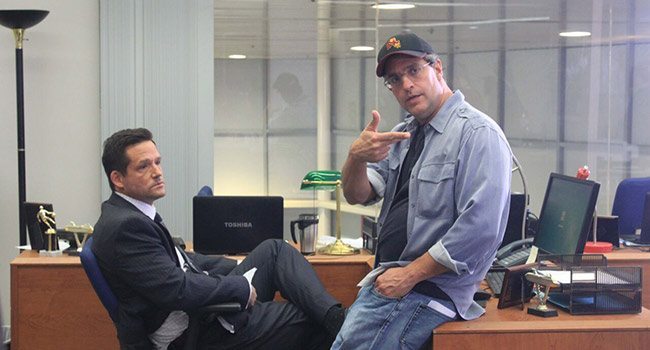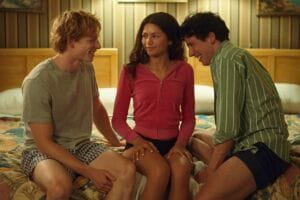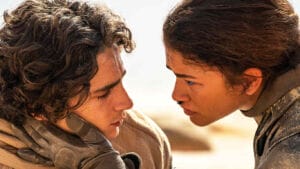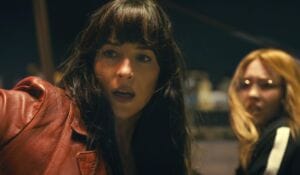I recently sat down with Adam Collis, the director of the upcoming “Car Dogs”: a movie made by and for Arizonans. The film, which was shot in Scottsdale and features fierce competition between car salesmen, opens up a unique opportunity for the movie business in The Grand Canyon State.
Our conversation has been edited for length:
Ryan Bordow: It’s so surreal to see a film set in a familiar area of Phoenix. Is the screenwriter of “Car Dogs” from Arizona as well? Why did this story need to be told here?
Adam Collis: This is a movie that is handcrafted for Phoenix, Arizona. And the culmination of this story is that the people of Phoenix get to decide whether this is a movie that gets to have a national release. Here you have this script set in Scottsdale, written by a Scottsdale native, shot in Scottsdale, made with 85 ASU student interns — a film that’s going to be exhibited in Phoenix’s own Harkins Theaters across the valley. What we’ve done that’s really special is designed our release with Phoenix as the launch pad. We’re all going to gather around opening weekend to see if this rocket that we’ve built is going to actually take flight so that people across the country will see it. If, of course, the good people of Phoenix come out and watch this really entertaining movie that was basically made for them! We shot right under the Papago Buttes! This has got Arizona in it through and through.
RB: I remember the notice that “Car Dogs” was looking for interns going out when I was a freshman film student at ASU four years ago. What was it like to see these students grow on set?
AC: Gosh, they were like the Three Stooges at the beginning: just bumping into each other, hardly knowing what to do. By the end of it, you wouldn’t know that these student interns were student interns! I’ve had so much feedback from the cast and crew, from people that visited set — they really got to learn how to be a professional on a film set from these working Hollywood professionals.
RB: That’s awesome.
AC: And now they’ve taken that into their own professional lives. Not just what they learned, but they also have their first feature film credit: that’s always the hardest one to get because breaking in is the hardest thing to do. And in addition to that, because they got to work with this Oscar-winning cast and crew, they’ve got somebody to call when they go to Hollywood — or, if Hollywood filmmakers come to Phoenix! It’s a launch pad for those careers, and we’ve got to launch this movie out of Phoenix, man. That’s the big story here. What’s really at stake here is that Phoenix has the chance to not launch the national release of a major motion picture. If it does well in Phoenix, man: [explosion noise].
RB: It expands to other theaters.
AC: And that’s why as part of ASU — the most innovative school in the nation, above MIT and Stanford — this is as good of an example of ASU innovation as you will get. This is no different in the creative arts than the innovation that the School of Earth and Space Exploration is doing to launch satellites around the moon! They’re launching a satellite around the moon; we’re launching a rocket for independent film so that everyone in this nation can see that rocket up in the sky. That requires everybody supporting the effort: the good news is they’re not doing charity work; they get to come watch a really fun movie about their hometown!
RB: Yeah. So, since you’re helping ASU students pursue the film world: why do you think it’s important that Arizonans pursue artistic endeavors?
AC: You know, some things you just do because they’re right. It kills me that Arizona is not Hollywood’s backlot.
RB: Me too!
AC: That’s what I always say: Arizona should be Hollywood’s backlot. And you can attribute that quote to me!
RB: [Laughs]
AC: We’re an hour Southwest flight away from Hollywood! Hollywood’s money is Arizona’s to lose! You think a producer would rather go all the way to Atlanta and be half a country away from their family and friends in Los Angeles? No, man! If they were shooting their TV or film project in Arizona, they could skip back that night to tuck their kids into bed. This is too good of an opportunity for the Arizona economy, and for filmmakers because there’s so much creative opportunity in this state.
RB: Makes sense to me. One of the actresses in “Car Dogs” is Octavia Spencer, who was just nominated for her second Oscar. What was it like for the interns to work with such a successful actress?
AC: The scene that she’s in is the pivotal scene of the movie. It’s worth going to see this movie just to watch that scene alone. She was grace personified. She was incredibly generous to our students with her time and spirit; she was wildly enthusiastic about what we were doing with the students. She gave our film a gravitas that I will forever be grateful to her for. You can just point the camera at Octavia Spencer and she could read the alphabet, and you could not take your eyes off of her!
RB: [Laughs] Lastly: March 24th is the release date of “Car Dogs”. Is there anything else in the future that Arizonans should be on the lookout for?
AC: If the good people of Phoenix can light a rocket on March 24th, you’re going to see all kinds of movies being made in Arizona.




